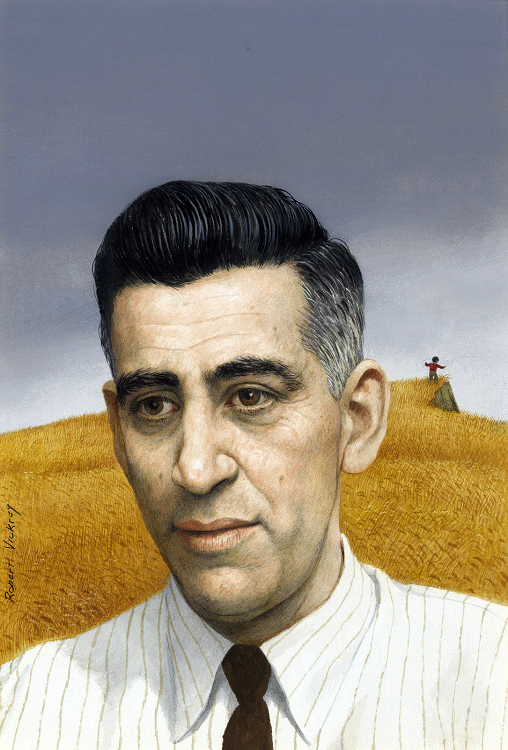zitiert als Äußerung Wilhelm Stekels in J.D.Salingers Roman "Der Fänger im Roggen". Deutsch von Heinrich Böll. Kiepenheuer und Witsch Köln 1962. Kapitel 24
Original englisch: "The mark of the immature man is that he wants to die nobly for a cause, while the mark of the mature man is that he wants to live humbly for one" - The Catcher in the Rye. © 1951. Penguin Books Harmondsworth 1971. Seite 195
In Stekels Werk findet sich allerdings nur das folgende sinngemäße Zitat von Otto Ludwig:
"Das Höchste, wozu er sich erheben konnte, war, für etwas rühmlich zu sterben; jetzt erhebt er sich zu dem Größern, für etwas ruhmlos zu leben." - Gedanken Otto Ludwigs. Aus seinem Nachlaß ausgewählt und herausgegeben von Cordelia Ludwig. Eugen Diederichs Leipzig 1903. Seite 10 archive.org http://archive.org/stream/gedankenottolud00ludwgoog#page/n39/mode/2up.
Jerome David Salinger Berühmte Zitate
„Man sollte nie jemand etwas erzählen. Sonst fangen sie alle an einem zu fehlen.“
"Der Fänger im Roggen". Deutsch von Heinrich Böll. Kiepenheuer und Witsch Köln 1962. Die letzten Sätze des Romans.
Original engl.: "Don't ever tell anybody anything. If you do, you start missing everybody."
"Der Fänger im Roggen". Deutsch von Heinrich Böll. Kiepenheuer und Witsch Köln 1962, Seite 219
Original engl.: "And I'm standing on the edge of some crazy cliff. What I have to do, I have to catch everybody if they start to go over the cliff - I mean if they're running and they do not look where they're going I have to come out from somewhere and catch them. That's all I'd do all day. I'd just be the catcher in the rye and all. I know it's crazy but that's the only thing I'd really like to be. I know it's crazy." - The Catcher in the Rye. Chapter 22
"Der Fänger im Roggen". Deutsch von Heinrich Böll. Kiepenheuer und Witsch Köln 1962, Kapitel 16.
Original engl.: "Certain things they should stay the way they are. You ought to be able to stick them in one of those big glass cases and just leave them alone. I know that's impossible, but it's too bad anyway."
"Der Fänger im Roggen". Deutsch von Heinrich Böll. Kiepenheuer und Witsch Köln 1962, Kapitel 18 (letzte Sätze).
Original engl.: "Anyway, I'm sort of glad they've got the atomic bomb invented. If there's ever another war, I'm going to sit right the hell on top of it. I'll volunteer for it, I swear to God I will."
„Man kann einen Lehrer nicht davon abbringen, wenn er irgendetwas vorhat. Er tut es einfach doch.“
"Der Fänger im Roggen". Deutsch von Heinrich Böll. Kiepenheuer und Witsch Köln 1962, Kapitel 2.
Original engl.: "You can't stop a teacher when they want to do something. They just do it."
Jerome David Salinger: Zitate auf Englisch
Raise High the Roof Beam, Carpenters and Seymour: An Introduction (1963), Raise High the Roof Beam, Carpenters (1955)
Raise High the Roof Beam, Carpenters and Seymour: An Introduction (1963), Raise High the Roof Beam, Carpenters (1955)
“How terrible it is when you say I love you and the person on the other end shouts back "What?"”
Raise High the Roof Beam, Carpenters and Seymour: An Introduction (1963), Raise High the Roof Beam, Carpenters (1955)
Raise High the Roof Beam, Carpenters and Seymour: An Introduction (1963), Seymour: An Introduction (1959)
Raise High the Roof Beam, Carpenters and Seymour: An Introduction (1963), Seymour: An Introduction (1959)
“Life is a game, boy. Life is a game that one plays according to the rules.”
Mr. Spencer
Quelle: The Catcher in the Rye (1951), Chapter 2
“Do you know what I was smiling at? You wrote down that you were a writer by profession.”
It sounded to me like the loveliest euphemism I had ever heard. When was writing ever your profession? It's never been anything but your religion.
Raise High the Roof Beam, Carpenters and Seymour: An Introduction (1963), Seymour: An Introduction (1959)
Raise their children honorably, lovingly and with detachment. A child is a guest in the house, to be loved and respected — never possessed, since he belongs to God. How wonderful, how sane, how beautifully difficult, and therefore true. The joy of responsibility for the first time in my life.
Raise High the Roof Beam, Carpenters and Seymour: An Introduction (1963), Raise High the Roof Beam, Carpenters (1955)
He was speaking, communicating, and yet not breaking the spell. I then broke it. Quite deliberately. "How can it be luck if I aim?" I said back to him, not loud (despite the italics) but with rather more irritation in my voice than I was actually feeling. He didn't say anything for a moment but simply stood balanced on the curb, looking at me, I knew imperfectly, with love. "Because it will be," he said. "You'll be glad if you hit his marble — Ira's marble — won't you? Won't you be glad? And if you're glad when you hit somebody's marble, then you sort of secretly didn't expect too much to do it. So there'd have to be some luck in it, there'd have to be slightly quite a lot of accident in it."
Raise High the Roof Beam, Carpenters and Seymour: An Introduction (1963), Seymour: An Introduction (1959)
